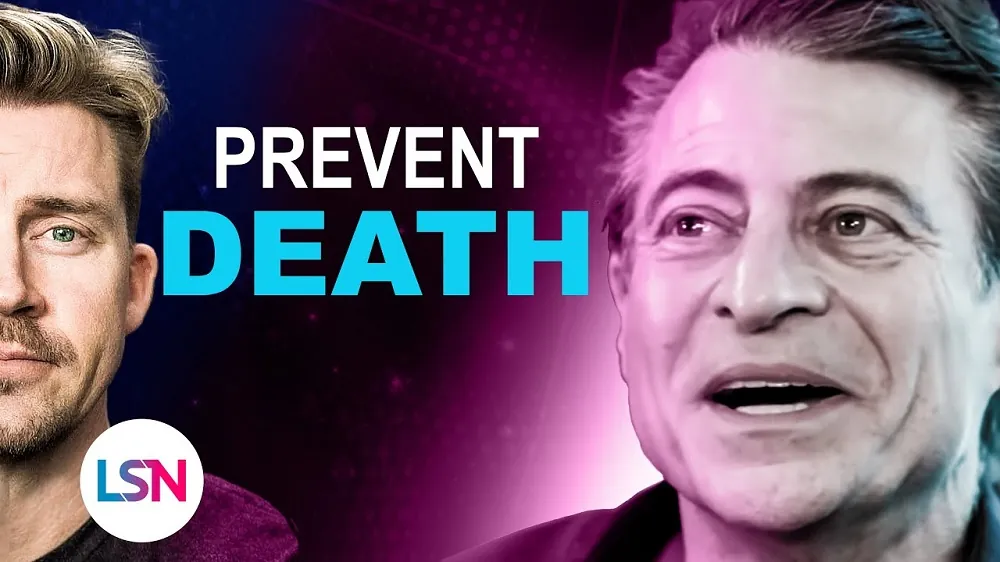On this episode of Lifespan News, Emmett Short talks about what can be done to modify the healthcare system in ways that focus on preventing, rather than reacting to, disease.
Script
Our healthcare system is downright dangerous. Why? Because it’s built on a reactive model that’s akin to waiting for a bomb to explode before attempting to defuse it. This isn’t healthcare, it’s disaster control.
Peter Diamandis founded a company to change that. Employing modern technology, scans, tests, and AI capable of finding and preventing many diseases long before symptoms appear. But the current healthcare landscape in the US is the biggest roadblock for this type of medical care.
In this video, I’ll show you the vision, the obstacle and a potential solution for upending the status quo and challenging the constraints of our current healthcare system. And creating a future where the focus is on extending our healthspan, our lifespan, and where aging is treated as a preventable disease rather than an inevitable decline.
Let’s create a vision for reshaping the healthcare system, and more than that, how we live our lives.
Let’s start with the exciting and potentially controversial stuff. Rich people investing in immortality.
This is the killer app. Living Plus? Live well… not forever. Why not forever? Well, sure, If not forever, live more forever. Pitch bot. Is it dope? It’s kind of dope. Like a robot please, Pitch Bot. it’s kind of dope.
Okay, I get it. It’s easy to be suspicious of rich people and criticize their longevity startups as somehow selfish or unfair or even immoral but I’m not going to talk about any of that mostly because I think it’s bull$#!%. Who are these critics? And who would they rather have trying to solve aging? People with no money? How’s that going to work?
Whatever your opinion is of Jeff Bezos, Sergey Brin, Craig Venter, David Koch, or Peter Thiel, you may one day have them to thank for your actual life. I’ll probably do a video at some point on why billionaires are an essential ingredient in the cure for aging but in the meantime if you want to check out a few videos we’ve already done on that topic they will be linked in the description. And, by the way, Living Plus did actually sound pretty great. Anyway.
XPrize Founder and CEO, futurist and best selling author, Peter Diamandis is putting his investors money where his mouth is. He was recently on Impact Theory with Tom Bilyeu talking about how he’s using AI to find patterns in complex health data.
What? Is that true? Excuse me, I need to go shotgun a bottle of baby aspirin.
A clinic that focuses on preventative care and uses AI to find patterns no human could see. This is a good time to mention a video we made recently on how generative AI is already being used to make the healthcare system better, faster and cheaper. Check that video out right here or in the description.
I assume most people that are watching this video are like me and they’d love to get all the preemptive scans and tests that they can if they could afford it. Barring a colonoscopy. I’m looking forward to these pill-size cameras going mainstream. Can we get some billionaires on the pill size camera situation?
Memberships at Fountain Life range from $11,700 for the Precision Diagnostics membership to $19,500 for the Apex concierge option, which includes unlimited access to a team to optimize your health on an ongoing basis. It’s kind of like what Bryan Johnson is doing for himself with Blueprint. And he’s apparently spending $2 million a year so compared to that Fountain Life is a steal.
Fountain Life is one of a handful of other companies popping up in the space like Forward Health, Prenuvo and Next Health which are all sort of boutique concierge health clinics whose services vary quite a lot but the running theme is they’re quite expensive. Which is why I actually got even more excited when I heard Peter talking about developing a health insurance plan to go along with Fountain Life.
So, here is the Fountain Health Website; if you’re an employer, you can apparently get this for your employees today. If you’d like more information about Fountain Health, perhaps a video that does a deep dive Into everything Fountain Health offers and how it stacks up to present-day insurance plans, let us know in the comments and we’ll see what we can do. Maybe we can talk to Peter and give you a walk-through, no promises, but let’s see how much interest there is down in the comments.
The big question I have when I see this chart, though, is yes I see how for a time perhaps while extending healthspan the money savings would seem to work out, but until we actually have a cure for death, eventually the procedures are going to get more and more extreme and desperate and therefore expensive near the end of life so I’m still curious if there’s a cost savings. Not because it wouldn’t still be worth it to extend healthspan but, you know, how do we incentivize insurance companies to do the right thing?
Peter Attia, M.D. founded Early Medical, another prevention focused clinic with the goal of lengthening lifespan and improving healthspan. He is also the author of the #1 New York Times Bestseller, Outlive: The Science and Art of Longevity. Peter was recently on the Rich Roll podcast talking about the problem facing preventative care in the US:
Right now, my health insurance is Aetna. Two years ago, it was Blue Cross. Three years from now, it’s going to be United. What incentive does Aetna have today to care about spending a dollar on me when they are pretty much positive they will not own my risk in 20 years when the chickens come to roost, Right. Like that’s the fundamental problem. It’s the portability of risk. And I don’t I mean, I’ve thought about this problem so much, but until you fix that problem, until there is true risk ownership between the patient and payer and the provider, and that is carried out over the course of your life, there is no incentive for them to carry any of that risk.
Great, so a single-payer system would shift the incentive, but we’ll need to watch out for other problems with Canada’s single-payer system that we’ll save for another video.
But what about stopping age related diseases by attacking the root cause, aging? How do we get insurance companies in the US and our government to incentivise this without nationalizing healthcare? Here’s bioethicist and Author of Hacking Darwin, Jaimie Metzl with one idea.
It’s not to make progress, it’s to get money.
Yes, but money is required to make progress, and money from insurance companies to pay for age-related preventative care could be unlocked if aging was classified as a disease. So I do feel like Jamie could have pushed harder on that issue. By the way, all the links to the full videos I’ve referenced will be posted in the show notes.
Lifespan.io has a few articles on the subject of classifying aging as a disease, so please go check those out. But just think about what it would mean if the FDA classified aging as a disease.
This reclassification would not only revolutionize medical research and treatment development, but it would also create significant commercial opportunities. It would inspire scientists to explore solutions, accelerate the approval process for age-targeted treatments, and crucially, open up a flow of investment into innovative companies pioneering this groundbreaking research.
With more money flowing in youd have larger pharmaceutical and biotech companies setting their sites on it. An entire new field of ‘age-related disease’ would present an appealing opportunity, especially given the potential market size – every aging adult. Can we get there without classifying age as a disease? Yes, and over at Lifespan.io, we have an article on that very topic.
But, in your host’s humble opinion, this change could democratize access to preventative care and treatments to millions, extending the benefits of scientific advancement to all corners of society.
I have personally created a change.org petition to urge the FDA to take this transformative step – to reclassify aging not as an unchangeable fact of life, but as a disease. If you are interested in adding your name to that the link is in the description. This isn’t just a scientific decision. It’s an economic one, a societal one, and above all, a human one. Let’s open the floodgates to progress and improvement in the quality of life for all.
There is hope for us yet, because maybe if you can hold on for another decade, enough could change.
Would you pay extra to potentially save yourself a lot of money and prolong your life? Are you dedicated to what Peter Attia calls the most effective longevity treatment? Exercise? Would you like us to do a more in depth video on Fountain Life or any of the companies mentioned in this video? Let us know in the comments. If you’d like to hear about another billionaire spending his money on curing aging you’re definitely going to want to check out this video right here.
If you enjoyed this video, please tap that thumbs up for the algorithm and share this on twitter or reddit or something like that. And if there is some aspect of Health and Longevity you’d like us to make a video on leave that in the comments as well. That’s it for this video. Have a great day, do something healthy, live long and prosper, and I’ll see you back here for the next one.




